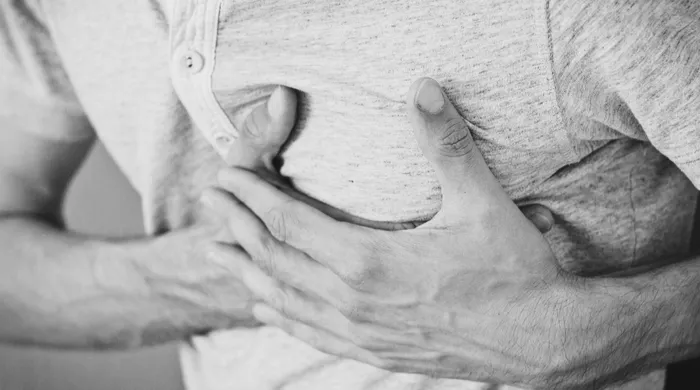Ayurveda and cardiovascular disease in men
Natural remedies

Research shows that men are more likely to be affected by cardiovascular diseases than women
Image: File
Cardiovascular disease (CVD) remains a leading cause of death in men worldwide. Factors like high cholesterol, hypertension, smoking, diabetes, obesity, and stress significantly increase the risk. While modern medicine offers treatments such as statins, beta blockers, and surgical interventions, there is a growing interest in natural approaches.
In this column, we explore how Ayurveda can support cardiovascular health in men. We also highlight key Ayurvedic herbs and formulations, presenting clinical evidence that supports their efficacy.
Why are Men prone to CVD?
Research shows that men are more likely to be affected by cardiovascular diseases than women, especially at an earlier age. This is due to the following:
- Diets high in saturated fats, trans fats, and processed foods lead to arterial plaque buildup, contributing to higher levels of visceral fat, which is often linked to insulin resistance.
- Testosterone's effect on lipid profiles and vascular inflammation.
- Unhealthy lifestyle, stress, alcohol, and tobacco use.
- Delayed diagnosis due to underreporting of symptoms.
- Genetic predisposition due to genetic factors such as cholesterol metabolism, blood clotting, etc.
The Ayurvedic perspective on heart disease
Ayurveda views the heart as a seat of consciousness, emotions, and vitality, governed by a balance of doshas (Vata, Pitta, and Kapha), which are biophysical mechanisms that are present in the body.
Common causes of heart disease in Ayurveda
- Ama (undigested metabolic toxins) accumulate due to weak digestion (Mandagni).
- An Imbalance of the Doshas: wWhen Vata is aggravated, it can lead to erratic circulation, palpitations, an irregular pulse, or poor perfusion to tissues, vascular stiffness, anxiety, fear, or insomnia, which increases mental stress and strains the heart. Conditions like these may present as arrhythmias, cortisol-induced spikes, or angina-like symptoms due to poor circulation.
When Pitta is aggravated, it causes inflammation in the blood vessels and heart tissue, leading to conditions like arteritis or endocarditis. An aggravated Kapha dosha can cause congestive heart failure and arteriosclerosis.
Important Ayurvedic herbs for cardiovascular health
- Arjuna (Terminalia arjuna) is a popular cardioprotective agent. Research studies show that Arjuna bark powder significantly improves symptoms and left ventricular ejection fraction in patients with ischemic cardiomyopathy.
- Guggulu is a gum resin derived from the resin of the Commiphora mukul tree. It is often combined with other herbs to enhance its effectiveness. Guggul's antilipidemic effects stem from its active compounds, guggulsterones, which inhibit cholesterol synthesis in the liver and enhance the breakdown of LDL cholesterol. Guggul's anti-inflammatory properties, mediated by its active compounds, suppress pro-inflammatory cytokines, reducing vascular inflammation and the risk of heart-related complications. Some of the common ayurvedic formulations where Guggul is used are Triphala Guggulu, Medohar Guggulu, and Yograj Guggulu..
- Ashwagandha (Withania somnifera) is a famous Ayurvedic herb due to its potent adaptogenic properties, which help reduce stress and serum cortisol levels, both common risk factors for CVD.
- Triphala (Haritaki, Amalaki, and Vibhitaki) reduces LDL cholesterol and triglycerides by inhibiting cholesterol synthesis in the liver and promoting lipid metabolism. Vibhitaki, in particular, is known for its lipid-lowering effects, while Amalaki’s antioxidants prevent LDL oxidation, a key step in atherosclerosis. Haritaki and Amalaki also suppress pro-inflammatory cytokines, reducing vascular inflammation.
Note: Chronic constipation and gut dysbiosis can contribute to systemic inflammation, a risk factor for heart disease.
Ayurvedic therapies for cardiovascular wellness
- Hridaya Basti (Oil retention on chest): It supports cardiovascular health by improving circulation, strengthening heart muscles, reducing stress, balancing doshas, and combating inflammation and oxidative stress. Its localised, natural approach makes it a unique Ayurvedic therapy for managing CVD risk factors, particularly in men. Its benefits are recognised under professional guidance as well as proper diet and lifestyle changes.
- Nasya (Nasal administration of oil): The nasal passages are considered a direct pathway to the head and upper body in Ayurveda, as they connect to vital channels (nadi’s). Nasya with medicated oils (example, Anu Taila or Shadbindu Taila) enhances blood flow to the brain and upper chest, indirectly supporting coronary circulation. It also reduces the risk of ischemia, a key factor in angina and coronary artery disease. It also supports overall vascular health and improves microcirculation.
- Shirodhara (oil pouring on forehead): Shirodhara stimulates the parasympathetic nervous system, calming the mind and reducing stress hormones like cortisol and adrenaline. The rhythmic flow of warm oil over the forehead activates nerve endings, promoting relaxation and balancing Vata dosha, which governs mental activity and stress responses. Shirodhara reduces blood pressure, heart rate, and strain on the cardiovascular system, mitigating the risk of hypertension and heart attacks.
Lifestyle and diet recommendations
- Include warm, lightly spiced foods,
- Use heart-healthy oils: ghee (in moderation, in the presence of high cholesterol), olive oil, and avoid fried, overly spicy, dry, and cold foods.
- Include fruits such as pomegranate, amla, apples, and berries.
- Practice yoga and pranayama, especially alternate nostril breathing, bhramari, and shavasana.
- Make it a habit to give yourself a warm oil massage with sesame oil before showering in the mornings.
- Adequate sleep, regular routines, and managing stress are key to improving the condition.

Dr Tamlyn Govender
Image: File
Dr Tamlyn Govender is registered with the Allied Health Professions Council of South Africa to practise Ayurveda. Her Ayurvedic practice is in Pretoria East. Visit www. ayuhealthandwellness.com, or email info@ ayuhealthandwellness.com. To learn more or to get more health tips, follow her on Instagram, Facebook, and YouTube@ ayuhealthandwellness.
* Always consult with a qualified Ayurvedic practitioner and your primary healthcare provider before making any changes.
Related Topics: